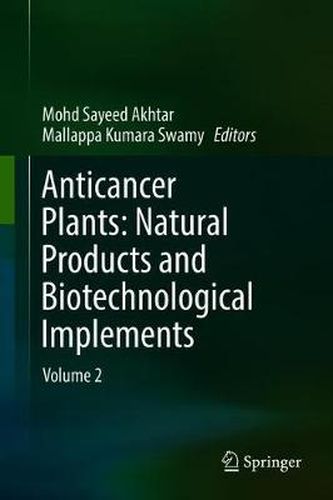Readings Newsletter
Become a Readings Member to make your shopping experience even easier.
Sign in or sign up for free!
You’re not far away from qualifying for FREE standard shipping within Australia
You’ve qualified for FREE standard shipping within Australia
The cart is loading…






This volume provides summarized scientific evidence of the different classes of plant-derived phytocompounds, their sources, chemical structures, anticancer properties, mechanisms of action, methods of extraction, and their applications in cancer therapy. It also discusses endophyte-derived compounds as chemopreventives to treat various cancer types. In addition, it provides detailed information on the enhanced production of therapeutically valuable anticancer metabolites using biotechnological interventions such as plant cell and tissue culture approaches, including in vitro-, hairy root- and cell-suspension culture; and metabolic engineering of biosynthetic pathways. Anticancer Plants: Natural Products and Biotechnological Implements - Volume 2 explores the natural bioactive compounds isolated from plants as well as fungal endophytes, their chemistry, and preventive effects to reduce the risk of cancer. Moreover, it highlights the genomics/proteomics approaches and biotechnological implementations. Providing solutions to deal with the challenges involved in cancer therapy, the book benefits a wide range of readers including academics, students, and industrial experts working in the area of natural products, medicinal plant chemistry, pharmacology, and biotechnology.
$9.00 standard shipping within Australia
FREE standard shipping within Australia for orders over $100.00
Express & International shipping calculated at checkout
This volume provides summarized scientific evidence of the different classes of plant-derived phytocompounds, their sources, chemical structures, anticancer properties, mechanisms of action, methods of extraction, and their applications in cancer therapy. It also discusses endophyte-derived compounds as chemopreventives to treat various cancer types. In addition, it provides detailed information on the enhanced production of therapeutically valuable anticancer metabolites using biotechnological interventions such as plant cell and tissue culture approaches, including in vitro-, hairy root- and cell-suspension culture; and metabolic engineering of biosynthetic pathways. Anticancer Plants: Natural Products and Biotechnological Implements - Volume 2 explores the natural bioactive compounds isolated from plants as well as fungal endophytes, their chemistry, and preventive effects to reduce the risk of cancer. Moreover, it highlights the genomics/proteomics approaches and biotechnological implementations. Providing solutions to deal with the challenges involved in cancer therapy, the book benefits a wide range of readers including academics, students, and industrial experts working in the area of natural products, medicinal plant chemistry, pharmacology, and biotechnology.